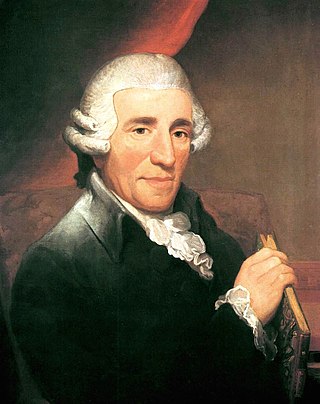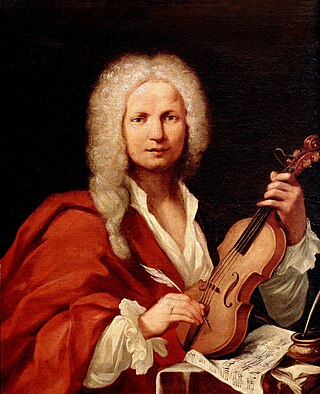Related Research Articles

Rinaldo is an opera by George Frideric Handel, composed in 1711, and was the first Italian language opera written specifically for the London stage. The libretto was prepared by Giacomo Rossi from a scenario provided by Aaron Hill, and the work was first performed at the Queen's Theatre in London's Haymarket on 24 February 1711. The story of love, war and redemption, set at the time of the First Crusade, is loosely based on Torquato Tasso's epic poem Gerusalemme liberata, and its staging involved many original and vivid effects. It was a great success with the public, despite negative reactions from literary critics hostile to the contemporary trend towards Italian entertainment in English theatres.

Jerusalem Delivered, also known as The Liberation of Jerusalem, is an epic poem by the Italian poet Torquato Tasso, first published in 1581, that tells a largely mythified version of the First Crusade in which Christian knights, led by Godfrey of Bouillon, battle Muslims in order to take Jerusalem. Tasso began work on the poem in the mid-1560s. Originally, it bore the title Il Goffredo. It was completed in April, 1575 and that summer the poet read his work to Duke Alfonso of Ferrara and Lucrezia, Duchess of Urbino. A pirate edition of 14 cantos from the poem appeared in Venice in 1580. The first complete editions of Gerusalemme liberata were published in Parma and Ferrara in 1581.

Jake Heggie is an American composer of opera, vocal, orchestral, and chamber music. He is best known for his operas and art songs as well as for his collaborations with internationally renowned performers and writers.

Armida is the fictional character of a Saracen sorceress, created by the Italian late Renaissance poet Torquato Tasso.
Judith Weir is a British composer serving as Master of the King's Music. Appointed in 2014 by Queen Elizabeth II, Weir is the first woman to hold this office.
Mary Zimmerman is an American theatre and opera director and playwright from Nebraska. She is an ensemble member of the Lookingglass Theatre Company, the Manilow Resident Director at the Goodman Theatre in Chicago, Illinois, and also serves as the Jaharis Family Foundation Professor of Performance Studies at Northwestern University.

Troilus and Cressida is the first of the two operas by William Walton, and was premiered in 1954. The libretto was by Christopher Hassall, his own first opera libretto, based on Geoffrey Chaucer's poem Troilus and Criseyde. Walton dedicated the score to his wife, Susana.

Armida is an operatic dramma per musica by Antonio Salieri in three acts, set to a libretto by Marco Coltellini. The plot is based on the epic poem Gerusalemme liberata by Torquato Tasso. Lully, Handel and Traetta, to name but a few, had already composed operas based on the situations that Tasso originally developed. The plot of all of these, and Salieri's work, is based on the relationship between Armida and the Crusader Rinaldo.

Armida is a 1784 opera in three acts by Austrian composer Joseph Haydn, set to an Italian-language libretto taken from Antonio Tozzi's 1775 opera Rinaldo, as amended by Nunziato Porta, and ultimately based on the story of Armida and Rinaldo in Torquato Tasso's poem Gerusalemme liberata.

Armida is an opera seria in three acts with music by Antonio Sacchini set to a libretto by Jacopo Durandi, based on the epic poem Gerusalemme liberata by Torquato Tasso. The opera was first performed during the 1772 Carnival season at the Teatro Regio Ducale in Milan.
Michel van der Aa is a Dutch composer of contemporary classical music.

Armida is an opera in three acts by Italian composer Gioachino Rossini to an Italian libretto by Giovanni Schmidt, based on scenes from Gerusalemme liberata by Torquato Tasso.

Armida Abbandonata is an opera in three acts by the Italian composer Niccolò Jommelli. The libretto, by Francesco Saverio De Rogatis, is based on the epic poem Jerusalem Delivered by Torquato Tasso. The opera was first performed at the Teatro San Carlo, Naples, on 30 May 1770. The young Wolfgang Amadeus Mozart was in the audience. He described the work as "beautiful but too serious and old-fashioned for the theatre". Nevertheless, despite a lukewarm reception at its premiere, Armida abbandonata was widely performed throughout Italy in the following years.

Armida al campo d'Egitto is an opera in three acts by Antonio Vivaldi to a libretto by Giovanni Palazzo. It was first performed during the Carnival season of 1718 at the Teatro San Moisè in Venice. Vivaldi's version is different from the more than 50 operas whose themes derive in varying degrees from the story of Rinaldo and Armida in Torquato Tasso's epic poem La Gerusalemme liberata. Unlike the more than 50 operas based on the romance of Rinaldo and Armida, Vivaldi's version starts during previous events before the war against the Crusaders. Armida was revived for the Carnival season of 1738, with much of the music rewritten, and arias by Leonardo Leo added. Act II of the original version of the opera is now lost.
Odaline de la Martinez is a Cuban-American composer and conductor, currently residing in the UK. She is the artistic director of Lontano, a London-based contemporary music ensemble which she co-founded in 1976 with New Zealander flautist Ingrid Culliford, and was the first woman to conduct at the BBC Promenade Concerts in 1984. As well as frequent appearances as a guest conductor with leading orchestras throughout Great Britain, including all the BBC orchestras, she has conducted several leading ensembles around the world, including the Ensemble 2e2m in Paris; the New Zealand Symphony Orchestra; the Australian Youth Orchestra; the OFUNAM and the Camerata of the Americas in Mexico; and the Vancouver Chamber Orchestra. She is also known as a broadcaster for BBC Radio and Television and has recorded extensively for several labels.
The Vanishing Bridegroom is an opera by composer Judith Weir to a libretto by the composer from work edited by J. F. Campbell of Islay. Commissioned by the Glasgow District Council, the opera was premiered by the Scottish Opera as a part of the 1990 European Capital of Culture celebrations in Glasgow. The United States premiere of the opera was given by the Opera Theatre of Saint Louis in 1992 with soprano Lauren Flanigan as the Bride/Wife/Mother.

Renaud is an opera by Antonio Sacchini, first performed on 28 February 1783 by the Académie Royale de Musique at the Théâtre de la Porte Saint-Martin in Paris. It takes the form of a tragédie lyrique in three acts. The French libretto, by Jean-Joseph Lebœuf, is based on Cantos XVII and XX of Torquato Tasso's epic poem Gerusalemme liberata and, more directly, on the five-act tragedy by Simon-Joseph Pellegrin, Renaud, ou La suite d'Armide, which had been set to music by Henri Desmarets in 1722 and was intended as a sequel to Lully's famous opera Armide. According to Théodore Lajarte, Lebœuf was helped by Nicolas-Étienne Framery, the regular translator of Sacchini's libretti.

The Italian composer Claudio Monteverdi (1567–1643), in addition to a large output of church music and madrigals, wrote prolifically for the stage. His theatrical works were written between 1604 and 1643 and included operas, of which three—L'Orfeo (1607), Il ritorno d'Ulisse in patria (1640) and L'incoronazione di Poppea (1643)—have survived with their music and librettos intact. In the case of the other seven operas, the music has disappeared almost entirely, although some of the librettos exist. The loss of these works, written during a critical period of early opera history, has been much regretted by commentators and musicologists.

La Dori, overo Lo schiavo reggio is a tragi-comic opera in a prologue and three acts composed by Antonio Cesti to a libretto by Giovanni Filippo Apolloni. It was first performed in the court theatre at Innsbruck in 1657. The story is set in Babylon on the shores of the Euphrates and is a convoluted tale of mistaken identities—a female protagonist who disguised as a man eventually regains her lost lover, and a man disguised as a woman who causes another man to fall in love with him. In several respects it resembles the plot of Cesti and Apolloni's earlier opera L'Argia and foreshadows Apostolo Zeno's libretto for Gli inganni felici (1695) and Metastasio's libretto for L'Olimpiade (1733). The first Italian staging of La Dori was in Florence in 1661 for the wedding of Cosimo III de' Medici, Grand Duke of Tuscany. It subsequently became one of the most popular operas in 17th-century Italy. The opera was revived three times in the 20th century, beginning in 1983.
References
- ↑ Stuart Jeffries, "Desert bloom", The Guardian , 1 December 2005.
- ↑ Judith Weir: Armida, Chester Novello music publishers.
- ↑ Photographs of the production and commentary on the official web site of The Continuum Ensemble
- 1 2 Judith Weir: Armida and Other Stories on the British Film Institute database
- 1 2 MUMS Opera Project Manchester University Music Society (2019).